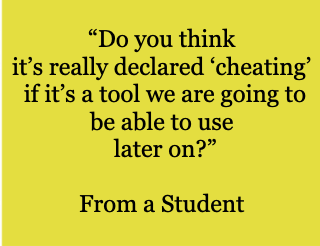A lot of conversation is going on about ChatGPT, AI, and how it can be utilized in the classroom. I wrote “Four Questions to Consider on Using ChatGPT in Education,” which is a great starting point for the conversation in schools.
For reference, here are the “4 Questions,” but I encourage you to read the entirety of the article, especially if you are having the conversation in schools.
As I have been speaking and working with groups on the topic, one thing I remind them of is that at the moment we are in, this is the worst technology will ever be. It will only become more powerful and its applications as we move forward, so it is better to learn to leverage it.
@peterhdiamandismd This is why schools should embrace technologies such as ChatGPT. They will become part of the curriculum sooner or later. #chatgpt #gpt #gpt4 #openai #ai #artificialintelligence #education #emadmostaque #aieducation ♬ original sound – peterhdiamandis
Now, I don’t agree with every comment in the interaction, but the question from the student was powerful.

In response to the student, Emad Mostaque states, “You will never not be with this AI when you grow up, and you have to prepare for that.”

During the presentation where I shared this, my colleague and good friend, Dr. Natasha Rachell, shared the following tweet:
Great question! Your thoughts? @gcouros #AtlantaPublicSchools pic.twitter.com/xkjLu8QOUS
— Dr. Natasha Rachell (@apsitnatasha) July 10, 2023
At the time I shared this, there were 41 replies, and I encourage you to check out the conversation for yourself.
On the same day, I noticed my brother, Dr. Alec Couros, shared the following:
The conversation re: academic integrity & AI continues to focus predominantly on preventing cheating. This is a dead end. Instead, it will necessitate a thorough commitment on the part of educators to rethink instruction, assessment, & our relationships w/ tech & each other.
— Dr. Alec Couros (@courosa) July 11, 2023
Now I don’t necessarily the conversation re: cheating is a dead end, as we do have to consider that education works within constraints, including state and provincial testing that is not (at least at this time) going to allow for the use of AI during an exam, but I do agree with the overall point.
When new things arise, we can’t just plug them into the old systems and expect the same results.
As John Culkin said (but it is often attributed to Marshall McLuhan), “We shape our tools and, thereafter, our tools shape us.”
In this post from Fred Davis in 2016, he shares how important having these conversations is for how we use technology and how important it is to focus on our humanity in a time of exponential change.
“The technology tools that we are shaping and that are now starting to shape us are at the edges of our comprehension. These will happen so fast that it will soon make us question the very nature of what it means to be human. We have to understand how tools are shaping us, and how to cope with that shaping in the time of hyper-change.”
Fred Davis, 2016
As I read the quote above from Fred Davis, I thought about how I have been advocating for this same “human-centered” approach to education and went back to this post I wrote in 2014. In that post titled “In a world that is extremely digital, we need humanity more than ever.” I shared the following.
“So with all the talk of technology, we just need to remember that there is so much more to schools and some of the best things in “20th Century Education” are just as relevant today.
If you are a school that does not focus on building relationships, you are on a faster road to irrelevance than one that doesn’t use technology.
In a world where information is easy to access and I can always find better content online than I can in school, the refocus on relationships is more crucial now than ever.
Embrace technology; it will provide people with opportunities that we could have dreamed of when we were kids.
But just remember that people will always be the most important part of the education system. As soon as we reduce everyone to a number or an avatar, we will have lost more than we could have ever gained.”
The potential for the future is amazing. And scary. And different.
But we also need to focus on what needs to stay the same. Students need to be able to read and write. Do math. Connect.
A cliche that drives me crazy is “We don’t need to throw out the baby with the bath water” when having these conversations. First of all, why is anyone considering throwing out babies? Seems like a weird analogy.
But more importantly, it is often a statement used as a disguise to disregard the new and hold on to the old.
I believe that it is never about the “basics” or “innovation,” but how do we build on the basics to go further now than we could when we were kids? I remember Yong Zhao saying, “Reading and writing should be the floor, not the ceiling.” That always resonated with me and reminded me that we have to build a base of learning, and from there, we can still aspire to reach the sky.
And in a time where information is abundant, we need to focus more on developing wisdom rather than simply garnering knowledge. The latter is imperative to gain the former, but it is not guaranteed.
Just some thoughts I wrote on my own before the robots start doing it for me.
